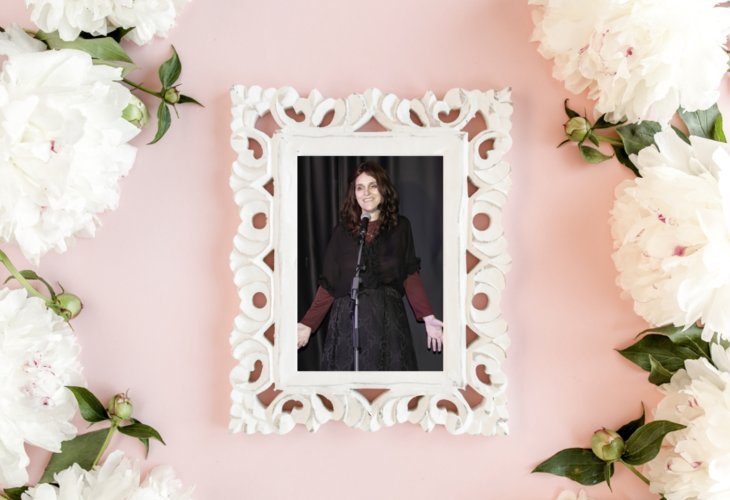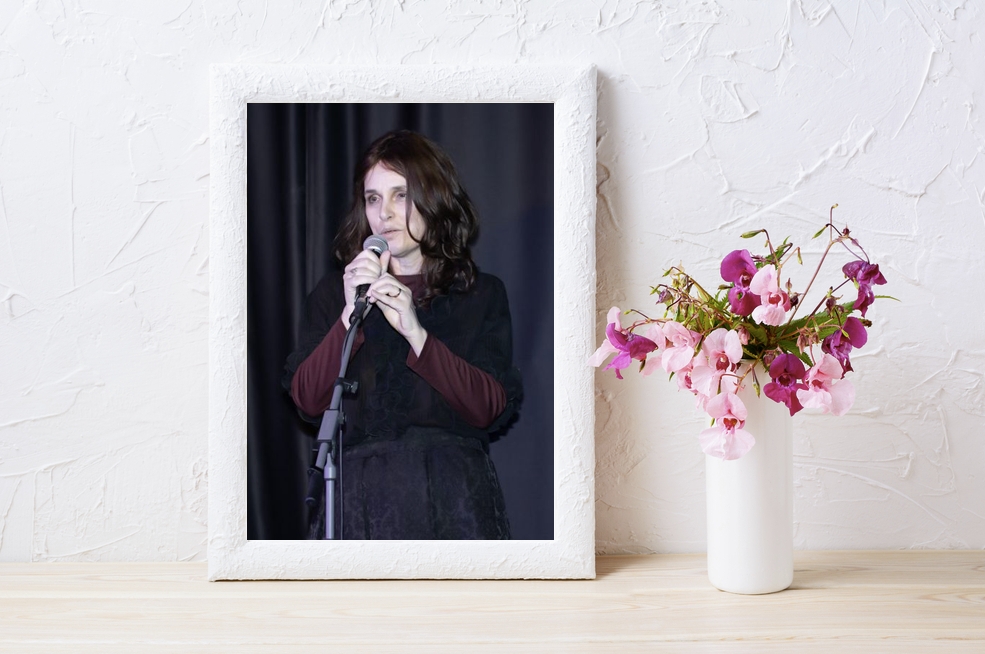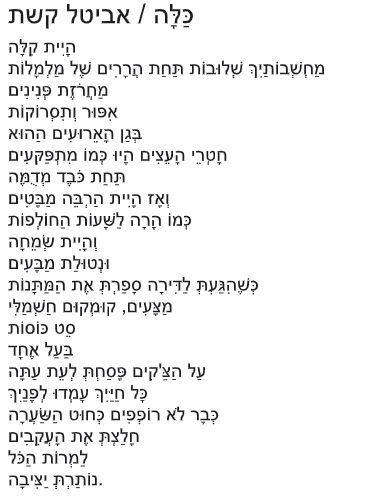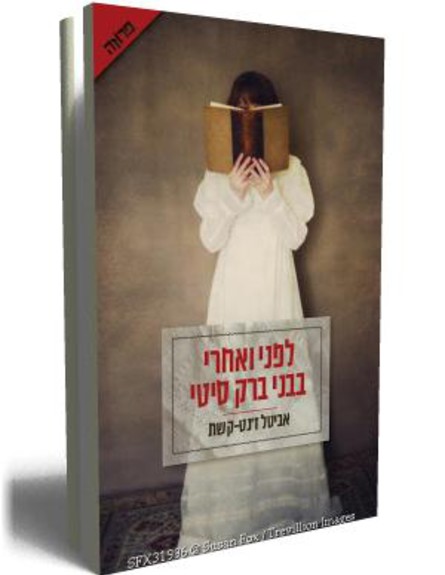Avital Keshet: "I Lived on the Border with Bnei Brak, I Never Thought I'd Become Part of It One Day"
When Avital Keshet moved near Bnei Brak, she could never have imagined how proximity to this unique city would open a gate to a new world for her. Alongside her husband, who discovered he was Jewish at the age of 14, she embarked on a journey, during which she found she had to reinvent herself professionally as a director.
 Avital moderates at a session at Uri Zvi Greenberg House
Avital moderates at a session at Uri Zvi Greenberg House"At the beginning of my journey back to faith, I worked as an artist during enrichment hours in kindergartens. One day, I sang a religious song to the children," recalls Avital Janet Keshet, who works in directing and writing. "They were thrilled and applauded, but the teacher was not pleased, and at the end of the hour, she asked me not to return. I realized that in her eyes, a real artist should come to the kindergarten in trendy pants and earrings, not with a headscarf or modest clothes. This is how I felt in other places I worked as a director, and although I was still the same Avital with the same professional knowledge, I understood that I needed to find a new path. That's where my search began as an artist in the Orthodox world. I came from an unapologetic background; I didn't know the rules in this new place and understood I had to learn a different language".
The challenges Avital faced led her to create platforms for other religious artists. Understanding there were those for whom art was their soul, she led open forums for poetry evenings, edited journals featuring women's creations, and wrote the book 'Before and After in Bnei Brak City' about her journey.
 Avital speaks at a poetry evening
Avital speaks at a poetry evening
"Came to Work? Let's Get You a Brit Milah"
"I'm one of the lucky ones who returned to faith together with her husband. Each of us had a different journey, but in the end, they converged," says Avital. "My husband didn't know he was Jewish until he was 14, and the moment he discovered it, he began a quest to find his roots, whereas I was always drawn to faith, and when the crack opened, I was drawn to it like a butterfly to light".
Avital started her life in Luxembourg, a small country on the border of Belgium and France. "We made aliyah when I was only a few months old, but Luxembourg remained part of my identity since we visited my grandparents there every year. In Israel, we lived in the Yad Eliyahu neighborhood of Tel Aviv, which had a traditional character, attending synagogue every Shabbat evening and saying Kiddush. However, a few years later, we moved to a different neighborhood, completely detached and even anti-religious. This influenced me, and Judaism seemed non-existent. I still harbored faith in my heart, but outwardly it showed no sign. I later studied acting at Beit Zvi, and the detachment only increased; we even rehearsed on Shabbat, and God or faith weren’t spoken of. Something at that place didn’t sit well with me, and without knowing why, deep inside, I felt disconnected".
After her marriage, Avital studied directing and focused on her new profession. "I worked in directing with small therapeutic groups, and during this time, our children came. In each of my pregnancies, the doctors predicted the worst, but I had a strong inner faith that someone was watching over me, and I wasn't willing to give any of them up. I remember during my first pregnancy, my husband and I went to pray at the Wailing Wall, and after the birth, we found everything was fine. Two of our children were born with high weights, but they were completely healthy. In hindsight, I see how these difficult transitions brought me closer to Hashem. Meanwhile, my brother began his journey back to faith. He served as a soldier at the Tomb of Rachel, and one of the rabbis there had a strong influence on him. One day he suggested my husband join him for a Torah class, and instead of resisting, my husband eagerly accepted the offer".
How can you explain that?
"My husband was born in Holland and didn’t know he was Jewish. He found out at 14 when his mother was on her deathbed and asked to be buried in a Jewish way just before she passed. From there, he continued his life as usual, but something within him began searching. He traveled to many places worldwide and also studied art and building restoration. His life could have continued like that, were it not for a job offer he received in Israel. At that time, they were looking for an expert to restore the Lomza Yeshiva building, and they approached him. My husband landed in Israel, and even before he started his work, they offered him a Brit Milah. At that time, there was plenty of restoration work in Europe, but something in Israel attracted him to stay. He still didn’t know anything about Judaism, but he felt this was the right place for him. His soul was hungry, and someone just needed to open the door. So when my brother suggested he come to a Torah class, it was like cold water on a parched soul. Finally, the door to inner fulfillment he always sought was opened, and from that one class, my husband continued to more classes".
During that time, the couple bought an apartment in Ramat Gan on the border with Bnei Brak. "There were no religious residents on our street, but 50 meters away, the reality was different. It took us a while to realize that the apartment we bought was so close to Bnei Brak, and when we found out, we were briefly apprehensive. I was especially concerned whether I could drive on Shabbat without facing backlash from the residents of the adjacent street," Avital smiles. "Who could have dreamed that one day Bnei Brak would not only cease to threaten us but be pleasant and welcoming. Following the move, my brother suggested I attend a Torah class in the city. He explained it was a special evening with refreshments and said, 'On the way, you can also listen to a lecture - what do you have to lose?' I've never been anti, so I decided to give it a try. I enjoyed the good atmosphere and listened to interesting lectures. During the evening, one of the event organizers approached me and asked if I would like to attend more activities. I told her it didn’t seem likely as I preferred staying home with my children in the evenings, but she wouldn’t give up and decided to follow up with me later".
Sometime later, the same organizer called Avital with what she termed 'a very exciting' announcement. "She told me they opened an institute near my home for mothers with children, and she invited me to come with them, offering free babysitting. I wasn't thrilled about going out with young children in the evenings, but something drew me to do it despite all the hardships. I started attending the institute weekly, which paved my way to the world of faith."

What were you missing in life that you searched for there?
"Life without faith left me feeling unanchored, and I also felt that in the world I came from, basic values were missing. I still remember attending a jazz performance by my daughter, where all the girls danced to a French song. No one besides me understood the lyrics, but they were appalling. I felt uncomfortable with my daughter receiving such messages, even indirectly, and generally, I saw how women’s status in the open world was heavily undermined. The sensation was that I was depriving my children of a fundamental, sensible value system, and over the years, the yearning for something different grew within me".
You're describing how you opened to the world of Torah immediately; were there also moments of fear?
"Of course, we were afraid, concerned that we were heading down an extreme path, especially growing up believing the world of the black-and-white clad was intimidating. But the deep hunger overcame all fears, and once the door to this goodness opened for us, it was obvious that this was the direction. Moreover, since the rapprochement began, I've seen increasingly how Hashem is with me, even in the smallest details. Since forever, it was clear to me that someone is watching over me, but with the strengthening, it became more tangible. One night, for instance, I dreamed of Rabbi Ovadia Yosef, and the next day someone told me that there was a Challah baking ceremony with the rabbi’s daughter that evening. I attended it, and during the evening, the daughter shared how important it was to her father that children recite the 'Shema Yisrael.' As a young girl, my grandfather taught me the bedtime 'Shema,' and this verse accompanied me over the years. I felt a deep connection to it, even though I didn’t understand anything, and hearing that the rabbi placed such importance on children saying 'Shema Yisrael' connected everything for me. So after a somewhat upside-down start to that day, this light gave me strength, and I felt how Hashem accompanied me and ensured my well-being."
"Religious? Not Here"
But as her journey back to faith progressed, Avital also faced unpleasant realities. "Once I became observant, they were no longer interested in what I had to offer, and I understood that in the acting and directing world I came from, there was no longer a place for me," she says regretfully. "I had to start finding my place in the new world to which I arrived, and from the difficulty in doing so, I preferred to stay home with the children for a few years."
However, the need to continue creating did not leave Avital alone for long. "At a certain point, I understood that I must return to the world of creation, and together with like-minded partners, we launched a project of poetry reading evenings. We led several such evenings in different cities, where I discovered many women eager for a world of creation. Observant women from all backgrounds came, and many joined the Torah world over time. All were looking for a way to express their creativity on some stage, and these special meetings gave them that place. I met, for example, a woman who played American folk music, which is not at all known in the observant world, and as a returnee to faith, she spoke about her difficulty finding her place anew. Later I edited a journal called 'Kol. Shira. Isha,' providing a platform for poets and writers, accompanied by photos or paintings from other artists."
From these experiences, Avital wrote a poetry book and her book 'Before and After in Bnei Brak City.' "The book was born from the crises, ups, and downs we experienced as returnees to faith, touching all layers of our lives, from our personal place to raising children and earning a living. At every stage of this journey, we had to learn everything anew, but eventually, the gate to 'Bnei Brak City' opened, revealing itself as a vibrant city."
 Before and After in Bnei Brak City
Before and After in Bnei Brak City
Creating During Corona – Is There a Chance?
Then came the coronavirus and disrupted many artists' plans. "Poetry evenings were halted, along with any chance to meet, and I experienced it as a significant hardship," says Avital. "It took me some time to recover, but it was clear that one cannot stop creating. So I launched an online journal called 'Enlightening the Voices,' providing a platform for women who wanted to keep writing, and we also managed to hold one poetry evening with women watching via Zoom. From there, ideas for the future started to unfold, and together with artist Galit Levy, I created a joint performance. The main thing for me was not to be in decline but to do the best possible in the existing reality."
But you know, art doesn't always bring income…
"True, but those whose soul is in it cannot go work in high-tech or construction. Despite all the challenges, they find ways to make a living from creative life or give it space as a hobby alongside another job. From my experience, I can say that if someone is truly focused on this, they will succeed in working even in this complex field, and in this context, I remember how at the beginning of my return to faith journey, I heard in one lesson that the Lubavitcher Rebbe encourages women to create. This encouragement gave me, as an observant woman, a lot of power to continue my work, and I hope other women, whose passion for the matter is deep, won’t let corona, or anything else, stop them."

